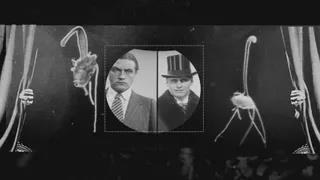International
Film Festival Rotterdam













will not be surprised that she has chosen to empathetically spotlight another unconventional lifestyle choice.
VERDICT: This entertaining rom-com offers a freshly subversive, anti-bourgeois twist on the genre, as a pastor and politician in Helsinki open up their marriage to non-monogamy.

Carmen Gray, February 1, 2023

A pastor and a politician in Helsinki agree to open up their marriage and see other people, in Selma Vilhunen’s entertaining Four Little Adults, screening in the Big Screen Competition at Rotterdam. It takes the romantic comedy-drama into decidedly edgier thematic territory than one would normally expect from the genre, as bourgeois conceptions of the nuclear family and the moral hypocrisy of clandestine infidelity are challenged. The film’s benign, broad humour and glossy lightness slyly serve its subversive intent further, normalising polyamory for a mainstream audience in easily digestible packaging. Those familiar with the Finnish director’s previous festival success Hobbyhorse Revolution (2017), a documentary about a community of teens who groom and ride toy horses,
The very public roles of parish priest Matias (Eero Milonoff) and Member of Parliament Juulia (Alma Poysti) raise the stakes considerably as they navigate the complex and evolving terrain of desire and commitment, aware spotless reputations are deemed indispensable to their careers. As the film opens, their current set-up of promised monogamy is no longer working. Matias has been in a year-long affair with Enni (Oona Airola), a single mother who works at a publishing house, who he shares wild nights with. He adores her, but also loves his wife, and is invested in raising the young son they have together. Juulia is devastated when the secret comes to light, but neither of them see divorce as an attractive solution to a seemingly impossible situation. At first, it seems we may be in for a story about a man who gets to have it all, while the women in his life reluctantly contort their needs and expectations to suit his whims. But the plot soon evens out when Juulia meets drag artist and pediatric nurse Miska (Pietu Wikstrom) in a club, and there is a spark. Miska has a boyfriend who lives in Stockholm but gives his blessing to him also seeing Juulia (who, in turn, abandons her plan to try out hook-up app Tinder.)
If this sounds complicated it is. Much humour and pathos is generated by the awkward, rocky meet-ups and trial and error by which these four adults try to work out an arrangement that meets all of their needs. Full Review
minimalism. Much of the narrative feels stagey and remote when it should be chilling and gripping. That said, this is a refreshingly original and often sublimely beautiful film. Following its world premiere in Rotterdam this week, it should appeal to festival programmers and African cinema aficionados, not least as a welcome rare gem from Namibia, whose tiny film industry has produced just a trickle of features since breaking free from South African rule in 1990.
VERDICT: A murder investigation in Namibia is haunted by echoes of colonial genocide in Perivi John Katjavivi's flawed but intriguing supernatural crime thriller.
Stephen Dalton, February 1, 2023
Set in the majestic rural hinterland of Namibia, Under The Hanging Tree is a rare murder thriller where the slaughter on screen is overshadowed by a much larger real-life crime from over a century ago. Writer-director Perivi John Katjavivi packages this story as a contemporary film noir, but it is rooted in the first genocide of the 20th century, when German colonial forces massacred around 100,000 Herero and Nama people between 1904 and 1908. This large-scale exercise in ethnic cleansing helped lay the blueprint for the Holocaust decades later, and remains a highly contentious issue between Germany and Namibia even today.


As the son of a black Namibian politician father and white English mother, Katjavivi is well-placed to interrogate the deep scars of European colonialism in Southern Africa from an informed insider-outsider viewpoint. Under The Hanging Tree approaches this material from an elliptical angle, adding hints of supernatural horror and magic realism, not always a good fit for the film’s leisurely pace and mannered
Cloaked in an ominous, almost Shakespearean sense of portent, Under The Hanging Tree opens with an old Herero man (David Ndjavera) crouched under the stars beside a flickering fire, his ritualised incantation summoning his ancestors to bless their children and avenge historial crimes against their people. The narrative focus then cuts to Christina Mireti (Girley Jazama), a young police detective who is also of Herero heritage but living a modern urban existence, cut off from tradition. Katjavivi presents his heroine as sullen, silent and withdrawn, perhaps hinting at her colonised and deracinated mental state.
Christina’s latest crime case takes her away from the city and deep into the bush, presented here as a majestic widescreen canvas against which humans are reduced to insignificant grains of sand. In uneasy partnership with local police officer Hosea (Dawie Engelbrecht), she visits a murder scene at the farm of a white family who are descended from the original German settlers. Even though her husband’s mangled body now dangles from a “hanging tree”, a site associated with colonial atrocities, Eva (Roya Diehl) appears eerily calm.
After this slow-burn set-up, Under The Hanging Tree takes a jarring left turn into gothic horror terrain in its closing stages, when a tense showdown at the farm escalates into a bloody reckoning over German colonial crimes. Full Review
VERDICT: A sensitive, intricately layered and hand-crafted portrait of mountain life in northern Albania, women’s labour and ancient laws.


Carmen Gray, February 1, 2023
Naomi Uman’s Three Sparks, screening in the Tiger Competition at Rotterdam, is a highly personal, hand-processed
record of what transpired when she journeyed into the mountains to film life in the north of Albania, a region notorious for its
ferocious dogs, but whose people (both Muslim and Christian) live side by side relatively peaceably. The American experimental filmmaker, who is very much in the frame, claims that she would scarcely have been able to carry out her project in the village of Rabdisht were it not for “besa”, the pledge of honour and duty to look after guests that is a cornerstone of Albanian culture, and which allowed her to feel safe as a solo female traveller and a Jew (the protective emphasis of “besa” led to the Jewish population expanding there during the German wartime occupation, as nearly two thousand were saved from Nazi persecution.) Uman’s potentially intrusive presence as an outsider, and the way power dynamics play out with a camera, Full Review

Now in its 24th year, the Rotterdam Film Festival’s Trainee Project for Young Film Critics hosts five talented, highly motivated film critics under 30, all coming from countries outside the Netherlands. The main objectives of the Trainee Project are the active support of film criticism, the promotion of coverage on independent filmmaking, and assisting talented young film critics in developing their careers.
To celebrate and affirm these objectives, and give participants a little push along the way, The Film Verdict will publish short reviews written by the five critics in the TFV festival dailies.

This year’s writers are Alonso Aguillar from Costa Rica, Madeleine Collier from the U.S., Lukasz Mankowski from Poland, Kyrylo Pyshchykov from Ukraine and Ren Scateni from the U.K.
Judit Elek signs copies of Judit Elek: The Lady from Budapest, a publication on her life and career, specially commissioned by IFFR



Łukasz Mańkowski is a film scholar and critic writing about Asian Cinema, a Japanese language translator, and a festival programmer for Five Flavours (Warsaw, Poland). Enrolled in the Ph.D. program at Artes Liberales (University of Warsaw), he prepares an interdisciplinary dissertation on the perception of Japanese New Wave and Avant-Garde Cinema and teaches classes on Asian Film. Łukasz participated in many critics' talent labs, including the 2021 IFFR's Young Critics Programme and Berlinale Talents 2022. His writing on Asian Cinema includes bylines in: MUBI Notebook, Sight & Sound, Senses of Cinema, Asian Movie Pulse, ALT/KINO, dwutygodnik, EKRANy, Kultura Liberalna, and Czas Kultury. He’s also a founder of the Asian Cinema-focused blog, “Kinema Chromatica”, and a mentor for the People's Jury at Five Flavours Film Festival. Łukasz is mostly interested in in-depth interviews, perspective on sound design, visual anthropology, moving images arts, and the current landscape of independent filmmaking in Southeast Asia and Japan.
What seems to be another Kore-eda-like magical realist representation of childhood transforms into a story of unprocessed trauma in Yusuke Morii’s Amiko, a rare gem among recent Japanese debut features that also addresses the complexities of motherhood and minutiae of patriarchal violence. Making its international premiere in Rotterdam’s Bright Future section, Amiko should feel like a discovery for festival programmers looking for fresh storytelling within the framework of Japanese family drama.
In the Hiroshima-set story of Amiko, played by a remarkably naturalistic and ambiguously irritating Kana Osawa, Morii focuses on the quotidian realm of the schoolgirl’s mind. The narrative unfolds entirely from her outlook: the life of her parents and older brother, but also that of a classmate she obsessively follows. Her idle daydreaming may dominate the early part of the film, but clever tonal shifts make Amiko a real heartbreaker in this convincing and unnerving portrayal of a family collapse. This is where Morii’s direction shines, as the traumas of the family remain unexpressed and left up to the child’s imagination, scored by the soft tunes of Ichiko Aoba’s avant-folk.

Filled with ghost stories and musical sequences, Amiko is a profound chronicle of kinship as well as an invigorating contribution to the longstanding tradition of childhood representation in Japanese cinema. Morii avoids resorting to misery-porn or sentimentalism and proves himself a filmmaker able to enthrall by combining an ambiguous scrutiny of Japanese society with an empathetic gaze towards his characters.
By Łukasz MańkowskiWith The Mysterious Affair at Styles, Hungarian filmmaker Péter Lichter delivers an inventive and unorthodox adaptation of Agatha Christie’s debut novel. The original story, which introduced the 1920’s reading public to Hercule Poirot, follows the renowned investigator as he disentangles a classic muddle of strychnine, infidelity, county manors, and double jeopardy. In the film, Christie’s story is delivered in a voice-over by Pál Mácsai; meanwhile, hundreds of sequences from silent films and detective video games collide and intertwine on the screen, exploding the narrative. The result is a rich and inventive archival work that connects the interactive, database nature of Golden Age mystery fiction with contemporary video games and internet architecture.
Christie, who once proclaimed, “My chief dislikes are crowds, loud noises, gramophones, and cinemas,” would likely be baffled by this hyper-stimulating adaptation, which pays tribute to the history of the moving image as much as the traditional whodunit. However, Lichter proves that Christie’s story finds a natural complement in both the melodramas of the period (including D.W. Griffith, F.W. Murnau, and Buster Keaton films) and the clue-seeking logic of digital culture. Updating the maps and diagrams included in Christie’s book to video game flythroughs and code terminals, Lichter invites us to explore the continuities and disjunctures between two distinct, historical modes of visual mapping. Controlling the audience’s attention with cursors and lassos instead of deceptive red herrings, Lichter simultaneously relates a dastardly murder and outlines a compelling theory of detective spectatorship.

 By Madeleine Collier
By Madeleine Collier
Madeleine Collier is a New York-based writer, researcher, and filmmaker, currently pursuing an MA in Film and Media Studies at Columbia University. Her work has appeared in Film Quarterly, Film Comment, and AfterImage Journal, among other publications. Her writing and research interests include: useful cinema, dubbing practices, emergent media, representations of labor, queer cinema, and glitch art.
